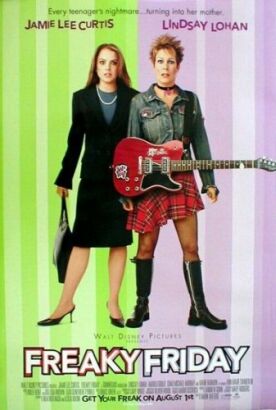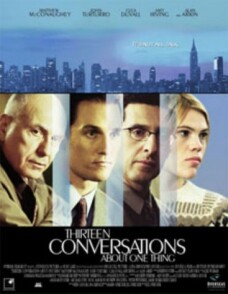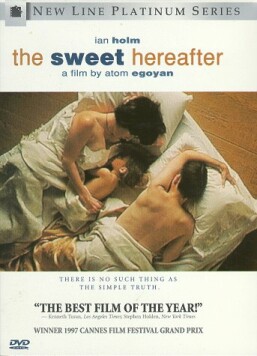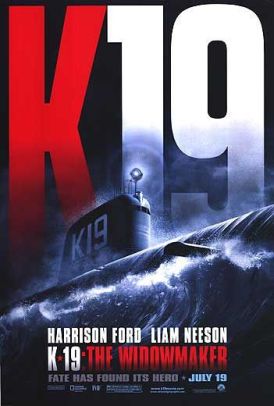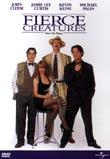Frequency
At the climax of Frequency, directed by Gregory Hoblit from a script
by Toby Emmerich., we see both Frank Sullivan (Dennis Quaid) and his grown son,
Johnny, a.k.a. the Chief (Jim Caviezel), fighting with the same man (Shawn
Doyle), the sort of policeman-cum-serial killer of a sort that only seems
to exist in the movies. Frank is meant to be fighting with him in 1969, Johnny
in 1999, but we are to understand that, through the magic of ham radio and the
aurora borealis, the two fights are taking place simultaneously on the very
special astral plane created by the movie. Without giving everything away, I can
reveal that one of the two Sullivans unexpectedly makes an appearance in the
world of the other—i.e not at the
other end of the ham radio connection across the years but where he is actually
in a position to do something helpful for the other.
In context, this surprise makes perfect sense, and in one way the movie has
prepared us for it very cleverly. But it has also forgotten something crucial,
namely that it cannot have been a surprise to the two men. Each hears the other
scuffling with his surprise visitor over the same ham radio set in the same room
30 years apart, but in order for the time barrier to be breached and help to be
brought, the knowledge of what was to happen would have to be carried for the
intervening period, thus allowing much more effective countermeasures against at
least the older intruder—who proves remarkably hale for a guy who has to
be at least 50-something. Yet they have apparently made no provision for dealing
with the life-and-death situation in 1999. In order to produce the apparent
surprise, the film-makers have had to make one of the two take care of his
version of the bad guy and then hop, as it were, across the 30 year divide
between them to help the other with his version.
This is ridiculous. But then, why quibble? The whole thing is ridiculous.
Time travel is always a tricky thing to play around with because of the
butterfly effect, which is a name someone made up to describe the supposedly big
differences that small things can make. A butterfly, it is said, flapping its
wings can be imagined to set in train a series of causes and effects that result
eventually in a hurricane. And although this claim seems a little far-fetched to
me, there can be no doubt that the changes in the Sullivans’ family life between
1969 and 1999 depending on the life or death of either or both parents would
have been much greater than it is represented as being here.
Frequency ignores all the butterflies and just concentrates on a few
very specific problems which young Johnny, with the benefit of hindsight and his
magic ham radio, is able to solve by giving some timely advice to his dad of
thirty years ago. Thus are avoided not one but several unhappy endings for their
little family. With each change made according to this advice in the past, the
future is changed, but only in simple and direct ways. Various bits of
dream-sequences are used to convey the impression that
Johnny’s memories in the present have
been adjusted to include or exclude a living father or mother, according to
whatever may be the current version of the past they have arranged for.
Newspaper clippings, photographs, memorabilia and so forth are likewise shown as
undergoing appropriate adjustments.
It is all too much. Less is more, Hollywood. Less is more. One change might
have filled us with some sense of the mystery and wonder of time and causality;
many changes, undertaken seriatim, simply diminish credibility, already
under considerable strain, to the vanishing point. The thing becomes a
child’s fantasy of being able to play
around with the past at will so as to produce a future without any of the rough
edges of casualty and loss that are the hallmarks of reality.
Wouldn’t it be nice if. . .? Yeah, but
it isn’t. Not only
isn’t it, it
couldn’t be, and we are merely being
self-indulgent to pretend that it could. For we know that, even if a given
butterfly does not produce a hurricane, a thousand other things would have
changed with each of the changes that Johnny and his dad effect, and their neat
little arrangement of a tearless future for their little family could in fact
have come about only by chance, just as it does for the rest of us.
It is the element of chance and luck, bad or good, which is the time-honored
way in which dramatic artists represent for us the essential fact of human life,
which is that we are not in control of what happens to us. There is a
strictly limited degree to which we can make it more or less likely that good
luck will befall us, but for all our progress in gaining control of nature,
cancer or accidents or even serial killers still occur to wreck our plans. It
still is the case that man proposes, God disposes. You
can’t put God on the stage or screen,
but you can remind people that He is more imaginative that we are and therefore
and most emphatically not at all like the cosmic sugar daddy that childlike
intelligences such as those that made this movie would like to think He is.
Discover more from James Bowman
Subscribe to get the latest posts to your email.


